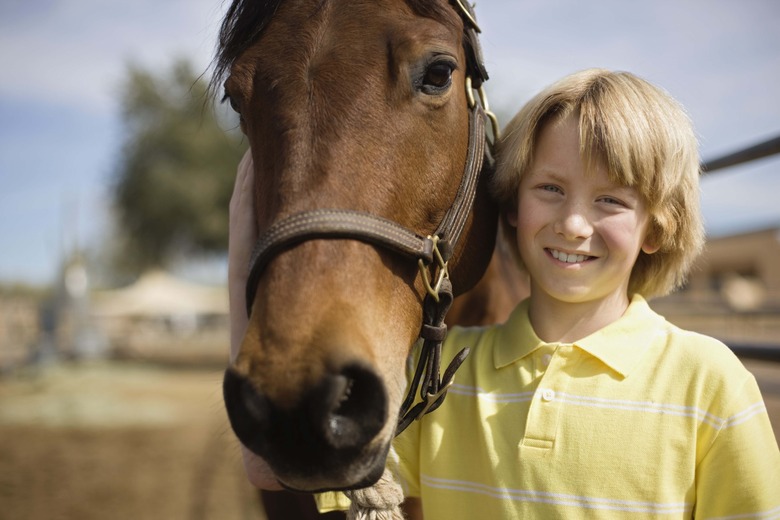Science Fair Project Ideas: Equine
Developing a science fair project that wows the judges is the highlight of many students' school year. The students who do well in science fair competitions are not always the students who excel in science. Choose a project based on your unique interests, such as a love of horses. Combine an interest in horses, throw in a dash of science and enthusiasm, and you have a recipe for science fair perfection.
Horse Display Project
Horse Display Project
A fairly simple science fair project involves identifying the different body parts of a horse. Perfect for younger elementary students, this project involves drawing or tracing a horse on to a poster board and labeling the animal's body parts. Older students with an interest in zoology could adapt this project to include a series of posters illustrating different horse breeds and using scientific names for the anatomy of horses. Consider using model horses to display and illustrate breed characteristics in addition to the posters.
Saddles and Riding Equipment
Saddles and Riding Equipment
Experimenting with various riding equipment helps you adapt you love of horseback riding into an effective, science project. Work with riders at a stable who use different types of saddles and other equipment. Track how the different equipment change a rider's gait or posture and affect the horses' performance.
Do certain types of saddles or saddle pads keep horses cooler than others? Ask questions about how equipment could make a horse or rider a more effective competitor in particular equine events.
Equine Stride Length
Equine Stride Length
Like humans, the angles of a horse's legs and shoulder differ from horse to horse and from breed to breed. Measure a horse's leg and shoulder angles, and compare and contrast the data to determine how those angles affect the animal's physical movement. This project will allow you to experiment with different ideas of kinesiology, or the study of movement.
Also experiment with how stride length affects a horse's competitive length. Does a certain leg length, horse height or shoulder angle make the animal a better runner or jumper? These projects are perfect if you enjoy spending time around horses, stables and horse competitions.
Parasites
Parasites
Science fair projects for students interested in equine veterinary science could involve determining if a horse's living conditions affect the development of parasites. Consider working with an equine veterinarian to develop case studies and gain access to a variety of equine living conditions. Are horses left in a pasture more likely to develop parasites than horses living in a stable? This type of project is more appropriate for older, high school students because students will need to collect and analyze a significant amount of data.
Horse Biology
Horse Biology
If you have an interest in zoology and biology, you should consider developing a project about how a horse's body systems work. Understanding a horse's digestive, cardiovascular, respiratory and muscular systems displays a wonderfully researched project. The key to this project is display and presentation. Create a spectacular presentation involving posters, models and photographs that highlight and explain everything you have learned about a horse's biological makeup.
Cite This Article
MLA
Maurer, Erin. "Science Fair Project Ideas: Equine" sciencing.com, https://www.sciencing.com/science-fair-project-ideas-equine-12742922/. 24 January 2010.
APA
Maurer, Erin. (2010, January 24). Science Fair Project Ideas: Equine. sciencing.com. Retrieved from https://www.sciencing.com/science-fair-project-ideas-equine-12742922/
Chicago
Maurer, Erin. Science Fair Project Ideas: Equine last modified August 30, 2022. https://www.sciencing.com/science-fair-project-ideas-equine-12742922/
